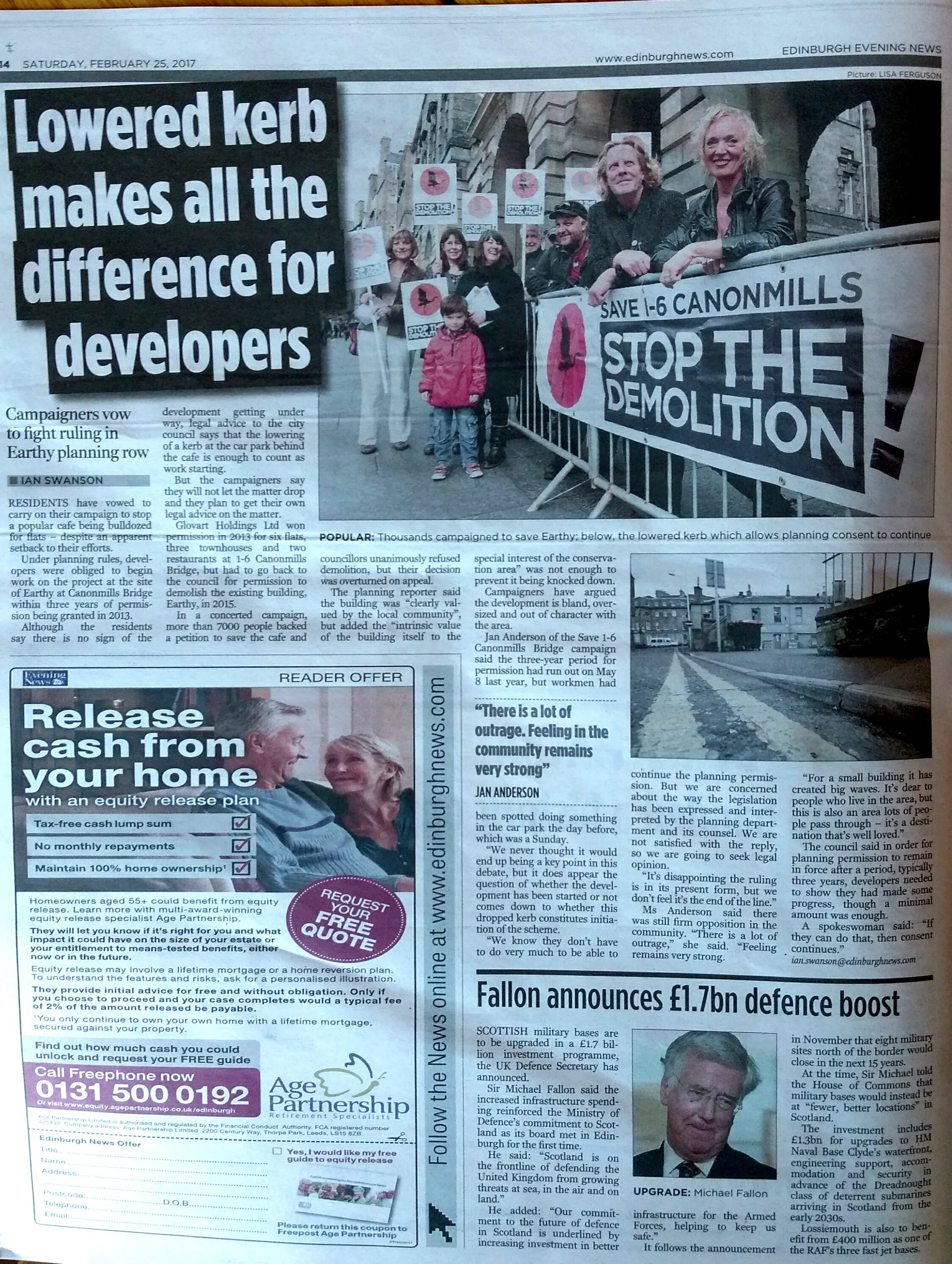
Locals campaigning to stop development of Canonmills Bridge have been hoping that planning permission for the site has lapsed.
Their optimism rested on the premise that, to the layperson's eye, work on the project did not appear to have started within the requisite three years since 8 May 2013.
In a minutely phrased statement from City of Edinburgh Council today, those hopes were dashed. Planning officials say the developer is entitled to continue with implementation of the consented scheme.
Rather than dipping a toe into the water by summarising that statement, only to find a dozen or so legal piranhas attached to it on the way out, we reproduce the Council bulletin unedited and in full below.
Needless to say: many locals will be bitterly disappointed.
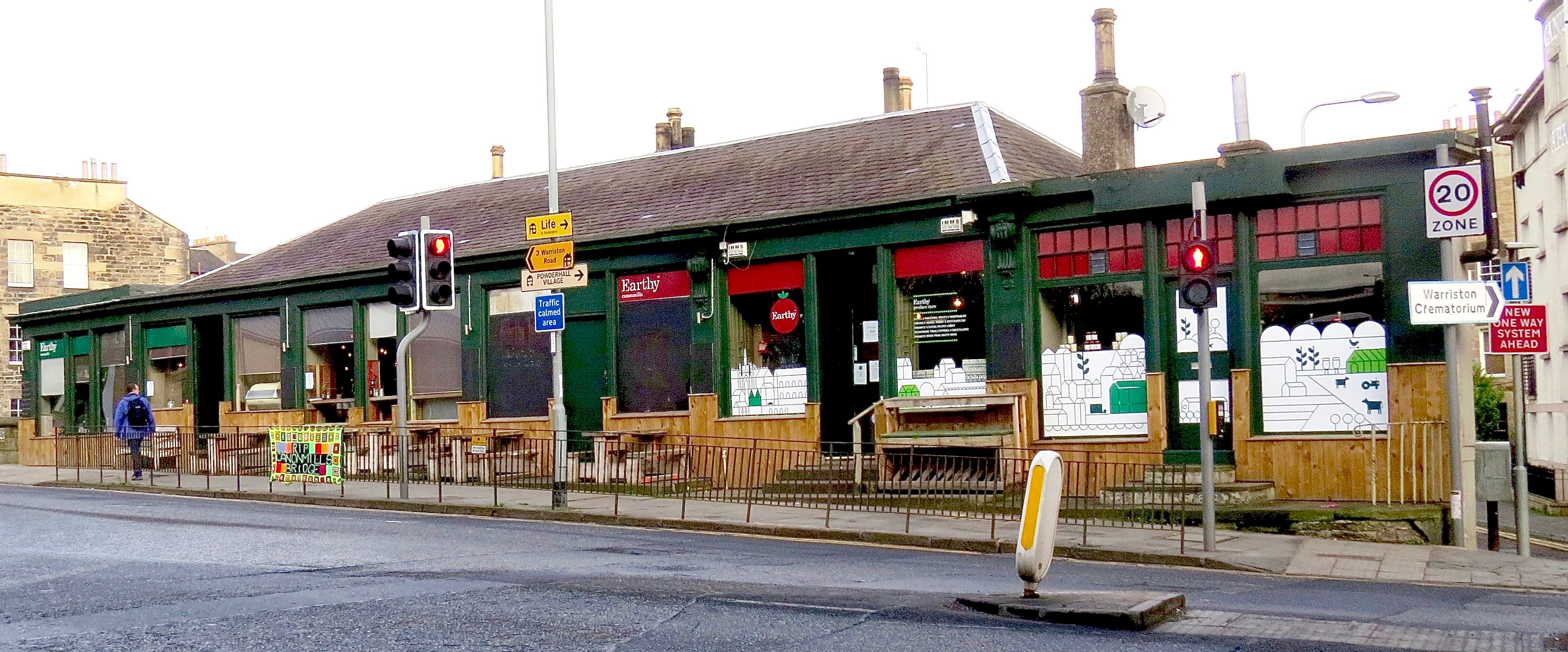
*****
COMMENCEMENT OF DEVELOPMENT
Planning Permission for this development was granted on 8 May 2013. The Planning Permission lapses after 3 years unless the consented development is commenced prior to that date.
In order for development to have commenced, it is necessary for the applicant to demonstrate that material operations have been carried out.
Development means the carrying out of building, engineering, mining or other operations, in, on, over or under land, or the making of any material change in the use of any buildings or other land.
Material operations include:
a) Any work of construction in the course of the erection of a building,
b) Any work for the demolition of a building,
c) The digging of a trench which is to contain the foundations, or part of the foundations, of a building,
d) The laying of any underground main or pipe to the foundations, or part of the foundations, of a building or to any such trench as is mentioned in paragraph (c) ,
e) Any operation in the course of laying out or constructing a road or part of a road, or
f) Any change in the use of any land which constitutes material development.
“Engineering operations” include the formation or laying out of means of access to roads.
It is well established that very little needs to be done in order to implement an express grant of planning permission. All that needs to be done must be done in conformity with the planning permission.
A site visit has been carried out and necessary liaison has been made with the Council’s Bridges and Structures Team with respect to works carried out along the site boundary with the Water of Leith.
Investigations suggest that the works carried out to the boundary wall onto the Water of Leith do not constitute material operations. This is because these works were carried out in relation to the flood prevention scheme and pre-date the issuing of the planning permission dated 7 May 2013. This opinion is made notwithstanding the assertion made by the applicant that these works were carried out in relation to the planning permission.
Agents acting on behalf of the applicant have submitted information as part of their notification of commencement of material operations that the vehicular access was formed on 10 June 2013 and that the kerb was dropped on 7 May 2016. Council officers initial view was that on the balance of probabilities that a material operation had been carried out, prior to consent expiring, meaning that the express grant of planning permission is capable of implementation.
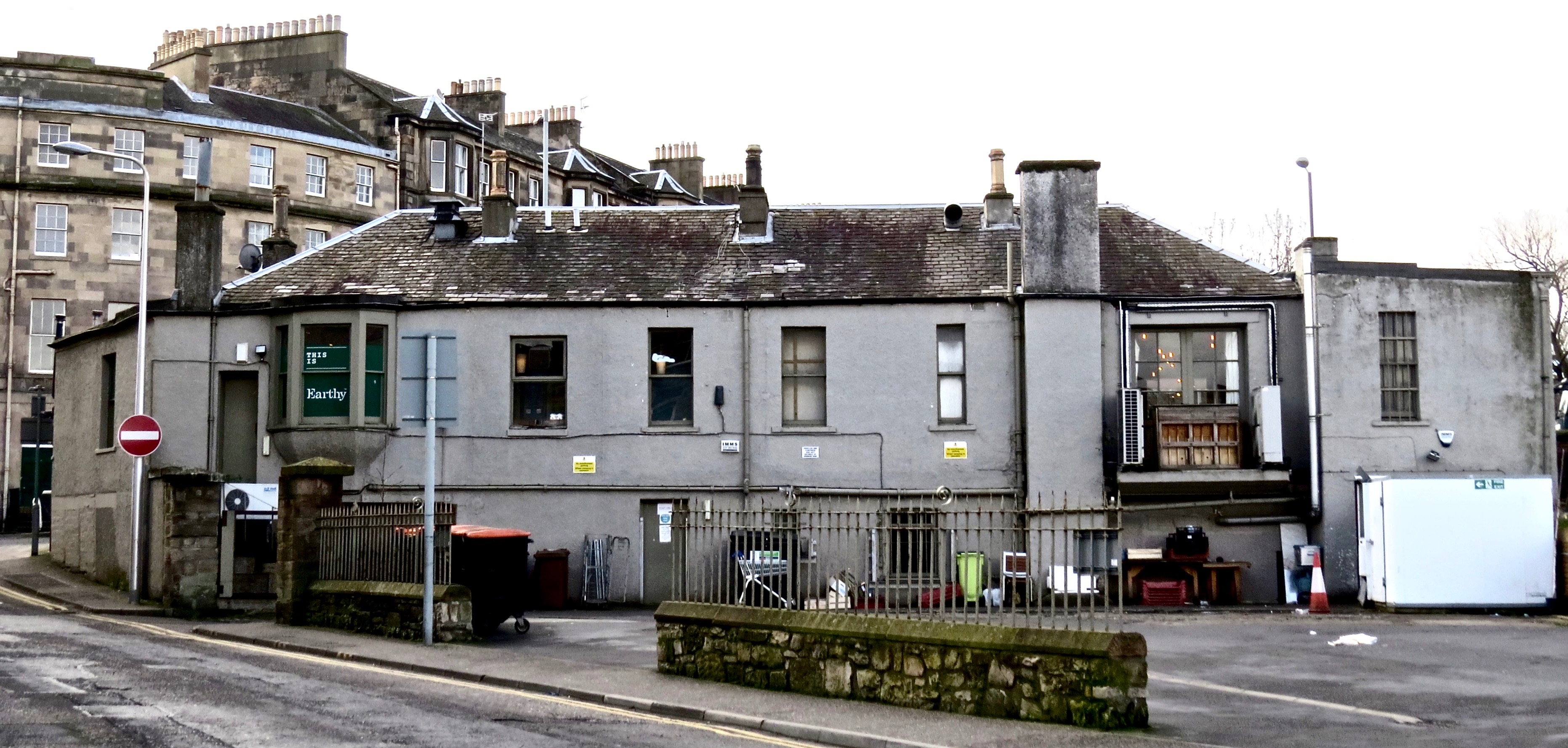
Counsel Opinion
Counsel Opinion has been sought. This agrees with the interpretation above. The opinion points out from case law the very low threshold required to amount to a material operation. In summary, it concludes that the works undertaken are sufficient to amount to material operations. However Counsel also advised:
- Checking that the two Suspensive Conditions on the consent had been complied with and whether this was prior to the alleged material operations being carried out; and In the event the suspensive conditions were not complied at the point of the first alleged material operation, whether the further alleged material operation, namely the kerb being dropped, did in fact occur prior to the expiry of the consent on 8 May 2016.
- In the event the suspensive conditions were not complied at the point of the first alleged material operation, whether the further alleged material operation, namely the kerb being dropped, did in fact occur prior to the expiry of the consent on 8 May 2016.
Conclusions Regarding Commencement of Development
With respect to the two suspensive conditions precedent attached to the permission relating to flooding and archaeology, the details regarding flooding have been submitted and considered acceptable while the written site investigation has been agreed with the Council’s Archaeologist. In both instances, these conditions are capable of full purification upon completion of the development and therefore their current status does not nullify the express grant of planning permission.
In both instances, these conditions are capable of full purification upon completion of the development and therefore their current status does not nullify the express grant of planning permission.
Any matters concerning the date on which the kerb has been dropped have been considered and it is accepted, on the balance of probability, that these works were carried out before the expiry of the planning permission. There is no evidence to the contrary, while there is an irrefutable presumption in favour of lawfulness unless there is such evidence.
On this basis, it is safe to conclude on the balance of probabilities that a material operation has been carried out meaning that the express grant of planning permission is capable of implementation.

REVOCATION
The Council has a general administrative discretion to make revocation orders for both the extant planning permission and conservation area consent.
Revocation would not affect any part of the development carried out. It is understood that material operations have commenced but that the extent or works carried out is not substantial at this juncture.
Given the nature of the development proposals, it would be reasonable to consider revocation of the planning permission and conservation area consent in tandem. Such orders would need to be confirmed by Scottish Ministers. If the Council seeks revocation the parties affected have the right to hearing before a Scottish Government Reporter, if they request it.
The general administrative discretion to use revocation powers is not unfettered. There would be a need to demonstrate that there has been a material change in planning circumstances since the original grant of planning permission and the more recent grant of conservation area consent. There has been no significant change in planning policy, government guidance, conservation area status or the general character of the area that would suggest that there are sound planning grounds which would convince Scottish Ministers to confirm revocation orders. This would be particularly difficult with respect to the revocation of the conservation area consent where Scottish Ministers, through their Reporter, recently granted this at appeal. Revocation could be viewed as an attempt to circumvent the normal planning process. In conclusion, the likelihood of Scottish Ministers confirming revocation orders in each case is low.
In the event that the revocation orders were confirmed the Council would be liable to pay a very substantial amount of compensation to the site owner and other parties eligible for compensation. This would not only relate to loss associated with depreciation of the value of the land but also professional fees incurred by the applicant. This is roughly estimated to be in the region of half a million pounds. All planning decisions require to be taken in the public interest and therefore the impact of such potential expenditure by the Council has to be considered in relation to the public interest.
An important further consideration in deciding whether to seek revocation in this instance, despite the low prospects of success, is the potential it has to undermine the planning system by creating uncertainty that planning decisions once made by the Council are final. Revocation of planning permissions throughout Scotland is highly unusual and decisions are rarely re-visted unless on strong and exceptional grounds. As set out above there are not strong and exceptional grounds for re-visiting the decisions in this case.

CONCLUSIONS
While the Council is entitled to seek to revoke extant planning permission and conservation area consent, it is unlikely that consent for this will be obtained from Scottish Ministers and even if it is compensation will be very expensive. In conclusion, the developer is entitled to continue with the implementation of the planning permission.
-------------------
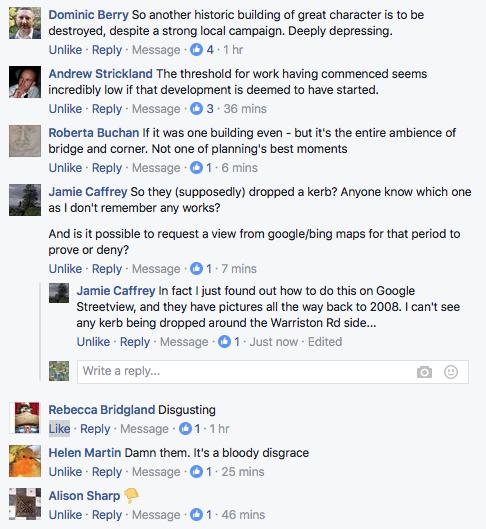
bugger
And this is total nonsense. @Edinburgh_CC should be totally ashamed.
@theSpurtle so all anybody need do to stop permission expiring is to drop a kerb! B*ll*cks!
 kitchen person @kitchenperson
kitchen person @kitchenpersonAn abhorrent decision that will have a severely detrimental effect on the Canonmills area. Nowhere in the city is safe! Heritage vandalism.
Knock down a valued old building, disturb local wildlife, and put up another f-cking monolith. Poor choice, Edinburgh council.
Sad news - another bit of Edinburgh's character and heritage destroyed

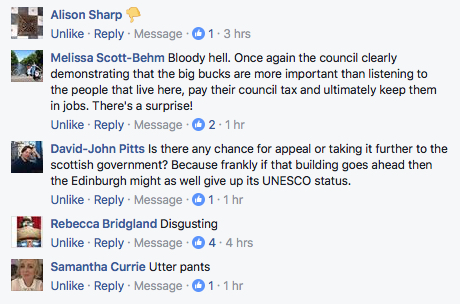
 David-John Pitts The design is so woefully out of context and ill appropriate that surely if the building of the actual structure can't be stop, then external appearance can be improved upon.
David-John Pitts The design is so woefully out of context and ill appropriate that surely if the building of the actual structure can't be stop, then external appearance can be improved upon. The use of materials and design could be mitigated and revised so that it wouldn't as ill fitting. The architect and the client must surely realise that..
What a great way to celebrate the Year of History, Heritage and Archaeology. Slow handclap Edinburgh Council.
Yet again @Edinburgh_CC approve the destruction of a historic building despite local campaigning to please developers. They're a shower.
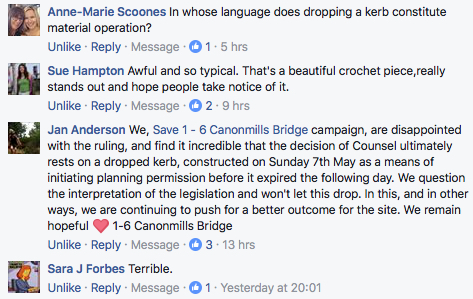
Email from Save 1–6 Canonmills Bridge Campaign Team (26.2.17):
Dear Supporters
You may be aware that the profile of Save 1-6 Canonmills Bridge was raised again last week (21 Feb) when there was a council ruling that was circulated to relevant council members and the campaign team, as well as being forwarded to The Broughton Spurtle. Here is the background and our update.
Following the granting of planning permission a developer is obliged to prove that development has been started within three years. The developer did nothing until 7th May 2016 which was the last day before permission expired. On that date, a dropped kerb at the entrance to the site was hastily constructed. The campaign team questioned whether this constituted initiation of development and the Council agreed to seek legal counsel on the matter.
You will find below Tuesday's statement from the Council, featured in full in the Broughton Spurtle. We question whether the dropped kerb qualifies as initiation of development. We question the expression and interpretation of the legislation, are currently seeking legal advice and won't let the matter drop. In this, and in other ways, we are continuing to push for a better outcome for the site.
❤We remain hopeful.
See here for Broughton Spurtle coverage:
http://www.broughtonspurtle.org.uk/news/hopes-dashed-over-canonmills
It is also covered in the Evening News for Saturday 25th February. Please find an image of the article attached.
